
Discrete Mathematics and Its Application
by Thomas Baxter
| ISBN | 9789372421019 |
|---|---|
| Publisher | Digital Drive Learning |
| Copyright Year | 2026 |
| Price | $262.00 |

by Thomas Baxter
| ISBN | 9789372421019 |
|---|---|
| Publisher | Digital Drive Learning |
| Copyright Year | 2026 |
| Price | $262.00 |
Discrete mathematics is the study of mathematical structures that are fundamentally discrete rather than continuous. In contrast to real numbers that have the property of varying "smoothly", the objects studied in discrete mathematics – such as integers, graphs, and statements in logic. Research in discrete mathematics increased in the latter half of the twentieth century partly due to the development of digital computers which operate in discrete steps and store data in discrete bits. Although the main objects of study in discrete mathematics are discrete objects, analytic methods from continuous mathematics are often employed as well. Discrete mathematics is the branch of mathematics dealing with objects that can assume only distinct, separated values. The term "discrete mathematics" is therefore used in contrast with "continuous mathematics," which is the branch of mathematics dealing with objects that can vary smoothly (and which includes, for example, calculus). Whereas discrete objects can often be characterized by integers, continuous objects require real numbers. This book attempts to put together all the essential topics of discrete mathematical structures for easy reference. The undergraduate students of computer science and engineering, postgraduate students of computer applications and computer science and engineering will find this book very useful.